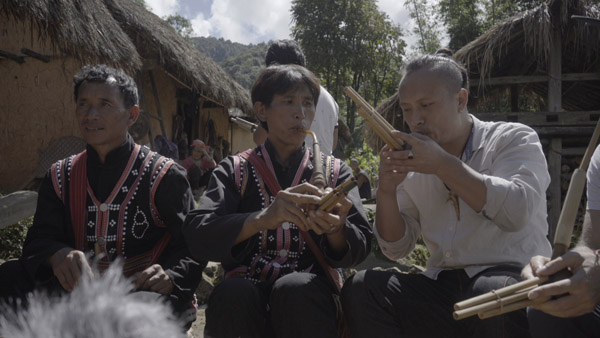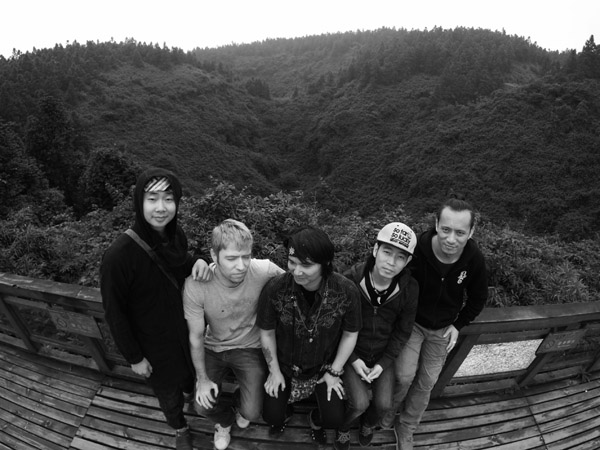A new online documentary follows members of the band Shanren into rural Yunnan, where they draw inspiration from ethnic Lahu music, Chen Nan reports.
The band Shanren ("mountain people"), whose members are mostly from Southwest China's Yunnan province, has its music rooted in ethnic tunes.
Bassist Sigao Ala is from the Yi ethnic group, instrumentalist Xiao Budian is from the Bouyei ethnic group, and vocalist Qu Zihan and drummer Xiao Ou are Han, while percussionist Sam Debell is from Britain. The band uses a mix of traditional and modern musical elements.
In the summer of 2017, the band traveled to Longtan Laozhai and Laodabao, two remote villages in Yunnan's Lancang Lahu autonomous county, administered by Pu'er city, where the Lahu people-one of the oldest ethnic groups in China-live. That trip has been turned into a documentary, entitled Discovering the Music of Lancang, and was released online on Jan 28 by Pollux, a music label of Beijing-based indie record company Modernsky.
 |
Shanren's members (from left) Sam Debell, Sigao Ala, Qu Zihan, Xiao Ou and Xiao Budian. [Photo provided to China Daily] |
The documentary opens with scenes from the daily life of the Lahu people, who sing and dance in traditional clothes, accompanied by a song performed in the local dialect. The Lahu song, Together, written by Li Naluo from Laodabao, depicts the locals celebrating Lunar New Year.
The documentary also shows members of Shanren learning to play local musical instruments such as the Lahu sanxian (a three-stringed plucked instrument) and lusheng (a reed pipe wind instrument) from rural residents and recording folk tunes. It was the first time that most of the band members had visited the two villages.
"According to local folklore, the Lahu people were born from gourds. Through generations, their music has been passed down orally," says Shanren frontman, Qu, who grew up in the mountainous areas of Yunnan and learned many local ethnic songs.
Influenced by rock music, he founded Shanren in 1999.
The band's bassist Sigao Ala says some words and phrases in Lahu are similar to those of the Yi ethic group, from which he comes.
"Although it was the first time that I visited a Lahu village, I felt a sense of closeness and soon grew curious about the language connections between the Yi and Lahu people," he says.
 |
Sigao Ala learns to play the lusheng from a rural resident during the band's trip to Yunnan [Photo provided to China Daily] |
Percussionist Debell, who had been to Laodabao in 2016, found that the Lahu people also use percussion instruments, which are similar to those used by other ethnic groups in that area.
"A lot of folk music is disappearing as many people are leaving the old villages. Only old people live there because they are used to the life," says the band's drummer Ou Jianyuan, known by his stage name Xiao Ou.
"We hope to play traditional music in such a way that it appeals to today's youth, so that they will pay more attention to traditional culture."
The influence of Western missionaries in the 19th century is still apparent in Lahu villages, as many residents learn choral singing and know how to play the guitar.
"From the kids to the adults, the village is one big choir," says Debell of Laodabao.
The classically trained musician, who has lived in Yunnan since 2001 and worked with bands such as Shanren, adds that the documentary is a good way to introduce the Lahu people to the world.
 |
The band members travel to villages in Yunnan, where the Lahu people live. The trip has been turned into a documentary, Discovering the Music of Lancang. [Photo provided to China Daily] |
He adds that when he first listened to Shanren's music about 20 years ago, he saw "the band's creativity of combining traditional melody with rock music".
With the help of Debell, who is also the international marketing manager for the band, Shanren has performed in over 20 countries, including the United States, Spain, Britain and Canada.
During the recent trips to the two villages, the band members also blended Lahu music into their upcoming album, which is scheduled to be released sometime this year.
"Half of the songs in the new album have been recorded and we are still working on the music arrangements, which combines the latest technology to make old melodies relevant to today's listeners," says Qu, adding that the new album will be more rhythmic compared to the previous two albums of the band.
Their debut album, Shanren Band, was released in 2008 after the band had performed at live house venues for almost a decade. The album depicts the lives of people in big Chinese cities.
In 2011, the band members traveled to remote areas of Yunnan, such as Nujiang, Lincang and Ximeng, and learned some local folk music and recorded samples. Two years later, they released a second album based on that trip, titled Listening to the Mountain. In 2016, the band won the TV reality show, Sing My Song, aired on China Central Television.
"We came to the big, bustling city of Beijing to chase our dreams. Now, we go back to the mountains," says Qu, who, along with other band members, returned to Yunnan in 2017 and set up their music studio in the provincial capital Kunming. "We had a hectic schedule of touring and now we want to slow down and explore more traditional Chinese music."
Contact the writer at chennan@chinadaily.com.cn

Presented by Chinadaily.com.cn Registration Number: 10023870-7
Copyright © Ministry of Culture, P.R.China. All rights reserved